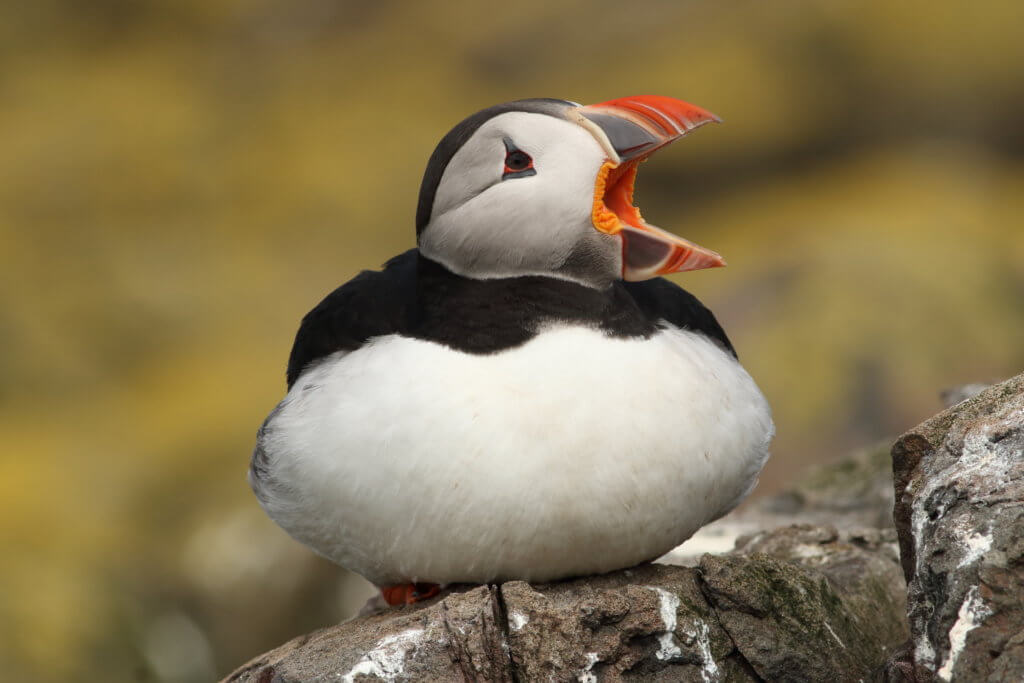
The ‘Clown of the Sea’ is no laughing matter
The Atlantic Puffin – familiar, comical and extraordinarily popular. During my bird watching youth I considered this a common species. So, within my short lifetime, it is hard to conceive the catastrophe that appears to be unfolding as populations of puffins and other familiar seabirds – kittiwakes, arctic terns & skuas – appear to be in free fall in many areas.
In 2015, the puffin was listed by IUCN as vulnerable to global extinction. Whilst scientists continue to search for more answers, the mounting evidence suggests that climate change – and particularly sea warming – is disrupting the entire food web from plankton through small shoaling fish to seabird populations. The warming North Atlantic appears to be undergoing fundamental change with huge falls in zooplankton abundance – as much as 70% in the North Sea in the last 50 years. This has led to crashes in sand eels – critically important food for many seabirds. Species such as terns and kittiwakes – which take sand eels from the surface – are doing far worse than birds such as razorbills, which take fish from greater depths.
Across the North Atlantic there are obvious problems. In Iceland there have been huge puffin decline, on the eastern seaboard of North America puffins and other seabirds are also suffering chronic food shortages, with birds catching less suitable prey in efforts to feed their starving chicks. Here in the UK, with our internationally important seabird colonies, there have been dramatic falls at some Scottish sites. On the remote island of St Kilda there has been a 99% reduction in kittiwake nests since 1990, a former vibrant colony at Marwick Head, Orkney is now quiet.
Similarly, Fair Isle puffins, have halved over the past 30 years, while on Orkney and Shetland guillemots have similarly declined with several colonies disappearing. Fulmars, arctic skuas and arctic terns have also suffered massive losses. Added together, these statistics indicate that, in the past 25 years, Scotland may have lost almost half its breeding seabird population. Some places, such as the RSPB reserve at Bempton Cliffs in East Yorkshire, seems to have fared better, but with climate change currently going in one direction the wider long term prognosis for puffins and many other seabirds appears grim indeed.
Against this catastrophic backdrop, it seems incredulous that our government has resolutely declined to fund a new national census in the wake of those organised in 1970, 1985 and 2000 and which it is supposed to instigate every 15 years. Now is the time when it is crucial to assess just how bad things are around our seabird colonies, and how best to focus our conservation efforts. This failure of a statutory duty of care is another yet another stain on the environmental credentials of our government.
The RSPB and others continue to raise the profile of this problem and conduct the scientific research to help inform the debate. Ultimately, this is a global issue, and the concept of losing such a charismatic species from our coastlines is yet another timely reminder of the need for all countries to work harder on global issues like climate change.
Image taken with Canon 70D at 1/400 second with a Canon 400mm f5.6 L lens at f11 ISO 250.
PS This particular puffin is also a movie star! I also took a brief video clip which was used in the fascinating documentary ‘Poached’ about the murky world of egg collectors.
[registration_form]
In Southern Iceland a spectacular decline also mirroring the effect of a rise in sea temperatures, while in Northern Iceland puffin populations remain at best stable.
The east coast England seem to be stable must be a good thing for them
This may also be in large part the reason for catastrophic declines in wild atlantic salmon salmon….
Can anyone give a short description of what the science shows. Industrial sandeel fishing has been reported as a cause of seabird decline for decades and decades but yet we appear to be no further along on the solving the problem. If seas are warming then perhaps the populations are moving further north in which case the UK losing it’s seabirds is of no real consequence. Puffin populations are well known to be “cyclic” in the sense that colonies wax and wane – are we any further along in understanding why that is the case. In short there appears to be a lot of hand-wringing over the state of seabird populations but no a lot of actionable ideas, for example a ban on sandeels being turned into pet food.